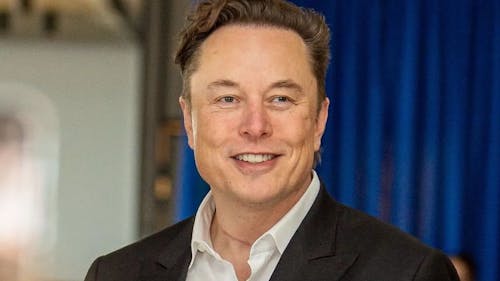Elon Musk's Twitter woes prove he's no champion of democracy

When Twitter CEO Elon Musk first indicated an interest in acquiring the platform early last year, he made one point abundantly clear: His top priority was protecting what he called "free speech."
"Free speech is the bedrock of a functioning democracy, and Twitter is the digital town square where matters vital to the future of humanity are debated," Musk said in a statement formally announcing his bid for CEO on April 25, 2022.
Then, the next day, as a response to the public’s uncertainty regarding his acquisition, he added, "The extreme antibody reaction from those who fear free speech says it all."
Musk may very well be humanity’s first digital dictator, according to his own ideas about free speech being the defining feature of a democracy. His actions so far have demonstrated a commitment to the principle of free speech — only as long as it doesn't inconvenience him or violate any of his personally held beliefs.
In the previously mentioned Twitter thread, Musk goes on to explain, "By 'free speech,' I simply mean that which matches the law. I am against censorship that goes beyond the law."
Initially, Musk seemed committed to this virtue, going so far as to reinstate the accounts of controversial people previously banned from the platform. They included Right-wing political figures such as Rep. Marjorie Taylor Greene (R-Ga 14), Roger Stone and most notably, former President Donald J. Trump.
When questions arose as to whether Musk would unban notorious conspiracy theorist Alex Jones, though, Musk vehemently denied the possibility of the InfoWars host’s return, saying, "My firstborn child died in my arms. I felt his last heartbeat. I have no mercy for anyone who would use the deaths of children for gain, politics or fame."
Heart-wrenching as his (albeit contested) story is, it's understandable why Musk would want to bar problematic users like Jones from using the platform to spread misinformation and hate speech. But the fact that Musk recognized the dangers of hosting Jones is a perfect example of why comprehensive content moderation is an essential component of any social media platform.
Although it was the morally sound choice, his refusal to reinstate Jones is certainly not moderating content to the extent "which matches the law," which infamously protects hate speech under the First Amendment.
This goes without mentioning the hypocrisy of Musk bashing Jones for building a fanbase around making light of incredibly serious topics, as Musk himself has gleefully done with issues such as transgender rights and coronavirus disease (COVID-19) misinformation.
Although his decision to maintain Jones’ ban was mostly received with sympathy, not all of Musk’s decisions regarding Twitter’s reinstated users have been quite as endearing. Soon after announcing his bid, questions arose regarding the fate of the former Twitter account ElonJet, a bot created by University of Central Florida student Jack Sweeney for the purpose of posting publicly available flight information for Musk’s private jet.
Shortly after his purchase of the company, Musk tweeted, "My commitment to free speech extends even to not banning the account following my plane, even though that is a direct personal safety risk."
This, in combination with a tweet posted in April 2022 detailing Musk’s desire for his worst critics to remain on Twitter, made it seem as though he was committed to his initial philosophy of laissez-faire content moderation.
That was until Dec. 14, 2022, when the jet-tracking account vanished from the platform, with Musk tweeting in response, "Any account doxxing real-time location info of anyone will be suspended, as it is a physical safety violation. This includes posting links to sites with real-time location info."
He later added, "Last night, car carrying lil X in LA was followed by crazy stalker (thinking it was me), who later blocked car from moving & climbed onto hood. Legal action is being taken against Sweeney & organizations who supported harm to my family."
The fact that the information posted by ElonJet is publicly available immediately disqualifies it from being classified as doxxing, which only really refers to publicizing private information. Additionally, the matter of publishing legally obtained, truthful data was deemed constitutional, according to Smith v. Daily Mail Publishing Co., in 1979.
When outlets attempted to report on this story, though, many journalists found their engagement in the discourse had resulted in their accounts being banned. In just one example of the journalists banned from the platform, Drew Harwell of The Washington Post lost his account for simply tweeting about the alternate social media profile Mastodon getting their Twitter account banned over sharing the link to the ElonJet website.
Following this purge, those banned found that although they were barred from posting or interacting with posts, they were still able to utilize Twitter’s Spaces feature. The tool allows users to create and attend what are in essence live chat rooms for specific topics, with any viewer able to request to speak on the matter currently in discussion.
This resulted in those banned for covering the ElonJet saga creating a Space to discuss the matter. They were then interrupted by the arrival of Musk himself, who awkwardly attempted to justify the bannings to those in attendance before abruptly leaving the Space and the Space feature being disabled entirely shortly after.
Between this incident and the platform’s previous major blunder regarding paid verification, it’s abundantly clear the public's doubts regarding Musk’s leadership were entirely justified. The future of Twitter remains incredibly uncertain, even with claims Musk intends to step down as the company’s CEO.



